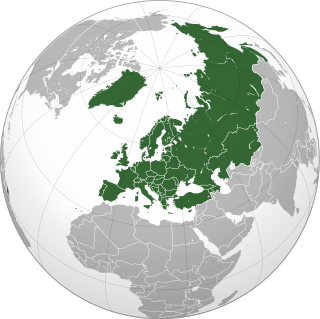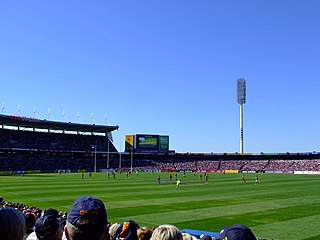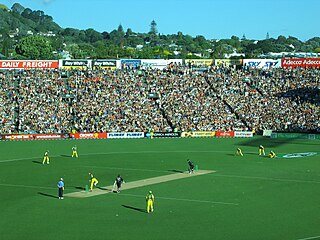
A European Championship is the top level international sports competition between European athletes or sports teams representing their respective countries or professional sports clubs.
Overtime or extra time is an additional period of play specified under the rules of a sport to bring a game to a decision and avoid declaring the match a tie or draw where the scores are the same. In some sports, this extra period is played only if the game is required to have a clear winner, as in single-elimination tournaments where only one team or players can advance to the next round or win the tournament.

The Fédération Internationale de Hockey, commonly known by the acronym FIH, is the international governing body of field hockey and indoor field hockey. Its headquarters are in Lausanne, Switzerland. FIH is responsible for field hockey's major international tournaments, notably the Hockey World Cup.

The International Rugby League (IRL) is the global governing body for the sport of rugby league football. Previously known as the Rugby League Imperial Board, the International Rugby League Board and latterly the Rugby League International Federation, the IRL is responsible for the Laws of the Game, the development, organisation and governance of rugby leagues internationally, and for the sport's major international tournaments; most notably the Rugby League World Cup.
The Presidents Cup is a series of men's golf matches between the United States and the rest of the world, held biennially.
Champions Cup may refer to one of many sports competitions:

Sport plays an important role in the business, community, social and cultural life in South Australia.
The Challenge Cup is a European rugby league competition held annually since 1896.

Association football is the most popular sport in almost all Asian countries. Cricket is the second most popular sport in Asia, and is most popular in South Asia. Other popular sports in Asia include baseball, basketball, badminton and table tennis among others. Top sporting nations in Asia include China, Japan, South Korea, Taiwan, India, Pakistan, Iran, Kazakhstan and Uzbekistan.
Rugby union is the most popular sport in Fiji ; however, rugby league, netball, and association football are also widely played. Various forms of traditional boat racing and wrestling are also popular.
An Asian Championship is a top level international sports competition between Asian athletes or sports teams representing their respective countries or professional sports clubs.
Nations Cup may refer to:
The United States national team or Team USA may refer to any of a number of sports team representing the United States in international competitions.

The most popular sport in Oceania varies from country to country. The most popular sport in Australia is cricket, the most popular sport among Australian women is netball, while Australian rules football is the most popular sport in terms of spectatorship and television ratings. Rugby is the most popular sport among New Zealanders. In Papua New Guinea, the most popular sport is the Rugby league.

Varsity Sports SA, is a group university sports leagues in South Africa. Its members all belong to the University Sport Company, and may each enter only one campus per competition, though they may enter different campuses for different competitions.

Australia competed at the 2016 Summer Olympics in Rio de Janeiro, Brazil, from 5 to 21 August 2016. Australia is one of only five countries to have sent athletes to every Summer Olympics of the modern era, alongside Great Britain, France, Greece, and Switzerland.

New Zealand competed at the 2016 Summer Olympics in Rio de Janeiro, Brazil, from 5 to 21 August 2016. This was the nation's twenty-third appearance as an independent nation at the Summer Olympics, having made its debut at the 1920 Games and competed at every Games since. The New Zealand team consisted of 199 athletes, 100 women and 99 men, across twenty sports, the first time New Zealand was represented by more women than men at the Summer Olympics.

Cricket, rugby union, rugby league & netball are the prominent sporting rivalries between Australia and New Zealand. In addition, respective national teams have competed in other sports such as indoor bowls, basketball, association football, field hockey and touch football.

New Zealand competed at the 2020 Summer Olympics in Tokyo. Originally scheduled to take place from 24 July to 9 August 2020, the 2020 Games were postponed to 23 July to 8 August 2021 because of the COVID-19 pandemic. It was the country's twenty-fourth appearance as an independent nation at the Summer Olympics, having made its debut at the 1920 Summer Olympics in Antwerp and competed at every Games since. The New Zealand team consisted of 212 athletes, 112 men and 100 women, across twenty-one sports.

Australia competed at the 2020 Summer Olympics in Tokyo. Originally scheduled to take place from 24 July to 9 August 2020, the Games were postponed to 23 July to 8 August 2021, because of the COVID-19 pandemic. Australia is one of only five countries to have sent athletes to every Summer Olympics of the modern era, alongside Great Britain, France, Greece, and Switzerland.









